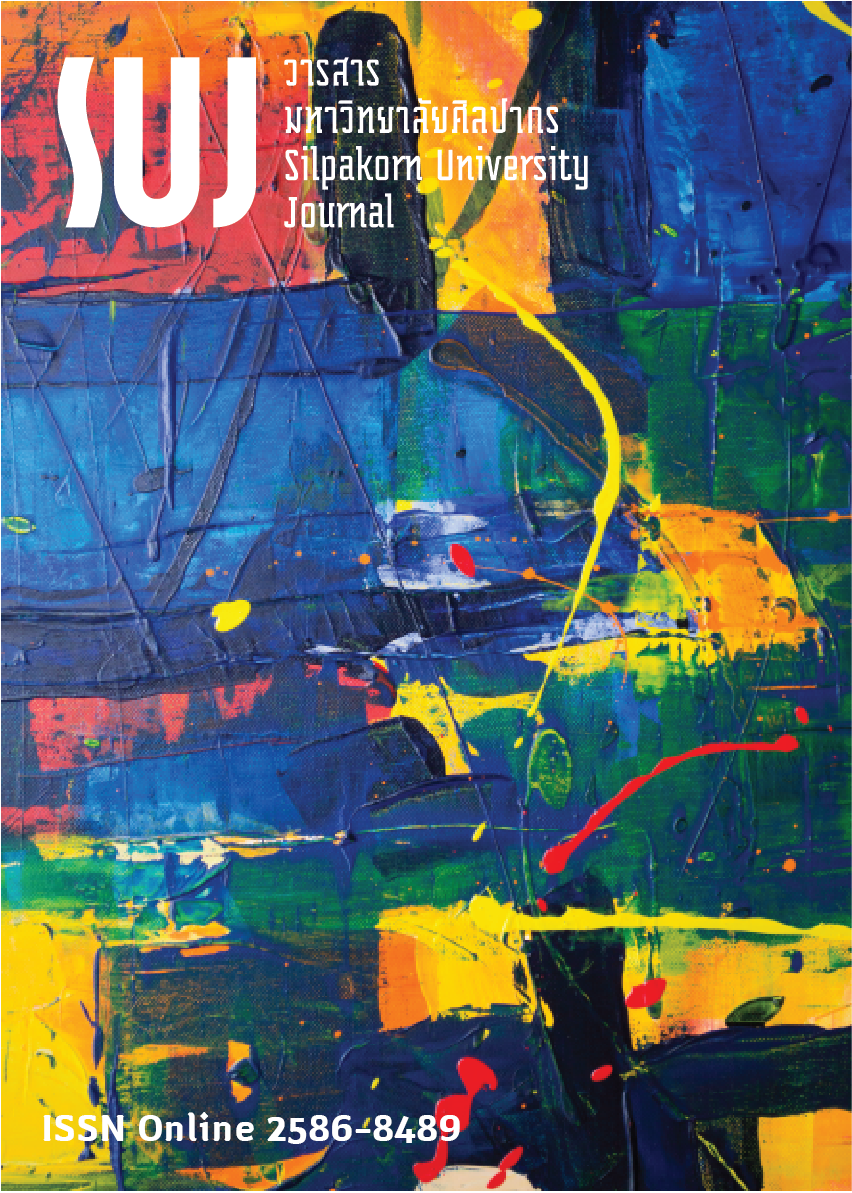ความรับผิดชอบต่อสังคมด้านแรงงานขององค์กรภาคอุตสาหกรรมในช่วงวิกฤต COVID-19 (Corporate social responsibility in relation to workers’ rights during the COVID-19 crisis)
Main Article Content
Abstract
งานวิจัยนี้มีวัตถุประสงค์คือ 1. เพื่อศึกษาระดับความรับผิดชอบต่อสังคมด้านแรงงานในช่วงวิกฤต COVID-19 และ 2. เพื่อวิเคราะห์ปัจจัยที่มีอิทธิพลต่อความรับผิดชอบต่อสังคมด้านแรงงานในช่วงวิกฤต COVID-19 ซึ่งมีลักษณะเป็นงานวิจัยเชิงปริมาณ โดยเก็บรวบรวมข้อมูลจากกลุ่มตัวอย่างที่เป็นองค์กรภาคอุตสาหกรรมขนาดใหญ่ในเขตกรุงเทพมหานครและปริมณฑล จำนวน 302 ราย โดยมีผู้บริหารองค์กรเป็นผู้ตอบแบบสอบถามการวิจัย สถิติที่ใช้ในการวิเคราะห์ข้อมูล ประกอบด้วย สถิติเชิงพรรณนา ได้แก่ ค่าความถี่ ค่าร้อยละ ค่าเฉลี่ย และค่าส่วนเบี่ยงเบนมาตรฐาน ส่วนสถิติเชิงอ้างอิง ได้แก่ การวิเคราะห์สหสัมพันธ์ และการวิเคราะห์การถดถอยพหุคูณแบบขั้นตอน ผลการวิจัยพบว่า องค์กรมีความรับผิดชอบต่อสังคมด้านแรงงานในช่วงวิกฤต COVID-19 โดยรวมอยู่ในระดับปานกลาง และพบว่าปัจจัยที่มีอิทธิพลต่อความรับผิดชอบต่อสังคมด้านแรงงานในช่วงวิกฤต COVID-19 สูงที่สุด คือ ปัจจัยด้านภาวะผู้นำการเปลี่ยนแปลง รองลงมา ได้แก่ ปัจจัยด้านการสร้างความผูกพันกับผู้มีส่วนได้ส่วนเสีย และปัจจัยด้านนโยบายความรับผิดชอบต่อสังคมตามลำดับ โดยผลการวิจัยครั้งนี้ ได้สะท้อนองค์ความรู้เกี่ยวกับการดำเนินงานด้านความรับผิดชอบต่อสังคมขององค์กรในช่วงวิกฤต โดยเฉพาะความรับผิดชอบต่อสังคมด้านแรงงาน ผ่านการศึกษาเชิงประจักษ์ภายใต้สถานการณ์วิกฤต COVID-19 ซึ่งถือเป็นการต่อยอดองค์ความรู้จากการศึกษาของนักวิชาการในอดีต นอกจากนี้ ผลการวิจัยยังสามารถนำไปประยุกต์ใช้เป็นแนวทางในการดำเนินงานด้านความรับผิดชอบต่อสังคมขององค์กร โดยเฉพาะในช่วงสถานการณ์วิกฤตที่เป็นอยู่ในปัจจุบัน
The objectives of this research were 1. to study corporate social responsibility in relation to labor’s rights during the Novel Coronavirus 2019 (COVID-19) crisis, and 2. to analyze factors which influence corporate social responsibility during the COVID-19 crisis. This quantitative study was done, using the questionnaire method for data collection. Samples were 302 managers of large industrial organizations operating in the Bangkok Metropolitan Area (BMA). Statistics used for data analysis comprised of 1. descriptive statistics, including frequency, percentage, mean and standard deviation, and 2. inferential statistics, using correlation analysis, and multiple regression analysis (Stepwise Method). The findings are that overall level of organizations’ responsibility during the COVID-19 crisis is moderate, and the factors influencing corporate social responsibility for labor rights during the COVID-19 crisis are transformational leadership, stakeholder engagement, and corporate social responsibility (CSR) policy. These findings reflect knowledge of CSR functioning during the crisis, especially the responsibility for worker’s rights, as an extension of knowledge obtained from previous studies. These results may be useful for CSR-related projects in particular during times of comparable crisis.
Downloads
Article Details

This work is licensed under a Creative Commons Attribution-NonCommercial-NoDerivatives 4.0 International License.
References
Aaker D. A., Kumar, V., & Day, G. S. (2001). Marketing Research (7th ed.). New York: John Wiley & Son Inc.
AccountAbility. (2011). AA1000 Stakeholder Engagement Standard 2011. [Online]. Retrieved May 20, 2020 from http://www.accountability.org/images/content/3/6/362/AA1000SES%202010%20PRINT.PDF
Aldrich, H., & Auster, E. R. (1986). Even Dwarfs Started Small: Liabilities of Age and Size and Their Strategic Implications. Research in Organizational Behavior, 8: 165-198.
Bank of Thailand. (2020). Impact of COVID 19 on the Thai Labor Market (ผลกระทบโควิด 19 ต่อตลาดแรงงานไทย). [Online]. Retrieved December 1, 2020 from https://www.bot.or.th/Thai/ResearchAndPublications/articles/Pages/Article_12Oct2020.aspx
Bass, B. M. (1985). Leadership and PerformanceBeyond Expectations. New York: Free Press.
Bass, B. M., & Avolio, B. J. (1990). The Implications of Transactional and Transformational Leadership for Individual, Team and Organizational Development. Research in Organizational Change and Development, 4: 231-272.
Bowen, H. R. (1953). Social Responsibilities of the Businessman. New York: Harper and Row.
Cronbach, L. J. (1970). Essentials of Psychological Test (5th ed.). New York: Harper Collins.
Freeman, R. E. (1984). Strategic Management: A Stakeholder Approach. Boston: Pitman.
Hair Jr, J. F., Black, W. C., Babin, B. J., & Anderson, R. E. (2010). Multivariate Data Analysis (7th ed.). Upper Saddle River, NJ: Pearson Prentice Hall.
International Labour Organization. (2020). Business Restructuring for Recovery and Recovery after the COVID-19 Crisis (การปรับโครงสร้างกิจการเพื่อการฟื้นฟูและการฟื้นตัวหลังวิกฤตโควิด-19. [Online]. Retrieved December 26, 2020 from https://www.ilo.org/wcmsp5/groups/public/---asia/---ro-bangkok/documents/projectdocumentation/wcms_754433.pdf
International Labour Organization. (2020). COVID-19 Employment and Labour Market Impact in Thailand. [Online]. Retrieved December 26, 2020 from https://www.ilo.org/wcmsp5/groups/public/---asia/---ro-bangkok/documents/briefingnote/wcms_747944.pdf
Jnaneswar, K., & Ranjit, G. (2020). Effect of Transformational Leadership on Job Performance: Testing the Mediating Role of Corporate Social Responsibility. Journal of Advances in Management Research, 17(5): 605-625.
Kalyar, N. M., Rafi, N., & Kalyar, N. A. (2013). Factor Affecting Corporate Social Responsibility: An Empirical Study. Systems Research and Behavioral Science, 30: 495-505.
Lindgreen, A., & Swaen, V. (2010). Corporate Social Responsibility. International Journal of Management Reviews, 12(1): 1-7.
Matli, W. (2020). The Changing Work Landscape as a Result of the Covid-19 Crisis: Insights from Remote Workers Life Situations in South Africa. International Journal of Sociology and Social Policy, 40(9-10): 1237-1256.
McKinsey. (2020). COVID-19: Implications for Business. [Online]. Retrieved December 26, 2020 from https://www.mckinsey.com/business-functions/risk/our-insights/covid-19-implications-for-business
Ministry of Labour. (2020). Monthly Labor Information Report, June 2020 (รายงานข้อมูลแรงงานรายเดือนมิถุนายน 2563). [Online]. Retrieved December 26, 2020 from http://warning.mol.go.th/uploadFile/pdf/pdf-2020-07-23-1595491574.pdf
Noonin, Sanit, Jadesadalug, Viroj, & Sansook, Jantana. (2017). Antecedents and Consequences of Strategic Corporate Social Responsibility: An Empirical Study of Hotel Business in Thailand (ปัจจัยเชิงสาเหตุและผลลัพธ์ของความรับผิดชอบต่อสังคมเชิงกลยุทธ์: การศึกษาเชิงประจักษ์ธุรกิจโรงแรมในประเทศไทย). Chulalongkorn Business Review, 39(3): 59-84.
Rovinelli, R., & Hambleton, R. K. (1977). On the Use of Content Specialists in the Assessment of Criterion Referenced Test Item Validity. Tijdschrift voor Onderwijsresearch, 2(2): 49-60.
Organisation for Economic Co-operation and Development. (2020). COVID-19 and Responsible Business Conduct. [Online]. Retrieved December 1, 2020 from https://www.businesshumanrights.org/sites/default/files/documents/OECD_COVID-19%20and%20Responsible%20Business%20Conduct_Full%20Note.pdf
Thailand Development Research Institute. (2020). From Closing the City to Recovery: the Unemployment Crisis Economic Scar Towards Creating Jobs and Long-Term Labor Potential (จากปิดเมืองสู่ฟื้นฟู: วิกฤตการว่างงาน แผลเป็นทางเศรษฐกิจสู่การสร้างงานและศักยภาพแรงงานในระยะยาว). [Online]. Retrieved December 20, 2020 from https://tdri.or.th/2020/09/the-unemployment-impacts-of-covid-19/
Tee, E., Asare, B. L., Opoku, T. R., & Tabitha, O-D. (2017). The Effect of the 2008 Financial Crisis on Corporate Social Responsibilities: Evidence from Multinational Companies. Research Journal of Finance and Accounting, 8(16): 20-30.
Thaipat Institute. (2020). Business Response Guidance on COVID-19. [Online]. Retrieved May 10, 2020 from https://thaicsr.sharefile.com/share/view/sc11fa6d66064146b
Weiers, R. M. (2005). Introduction to Business Statistics (5th ed.). Pennsylvania: Duxbury Press.


